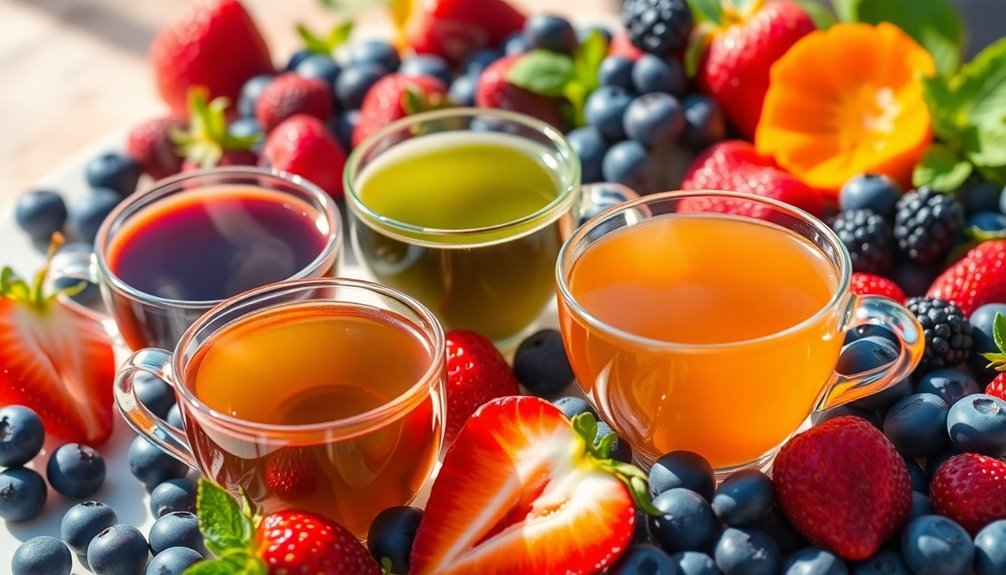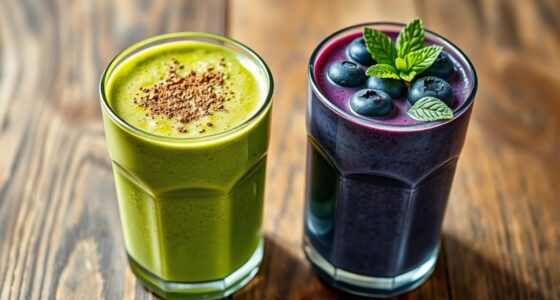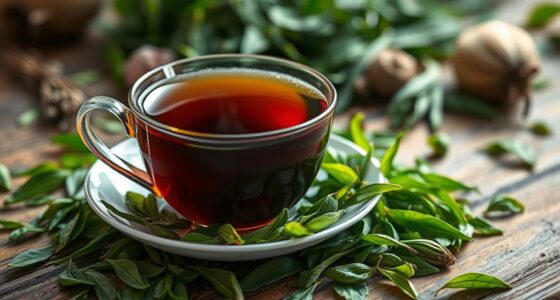The shocking truth about antioxidants in tea is that they can offer amazing health benefits. Varieties like green, black, and white tea contain powerful antioxidants such as catechins and polyphenols, which help boost your immune function and combat oxidative stress. The level of antioxidants varies significantly based on the tea type and the way it's prepared, so steeping time matters. Enjoying 3-5 cups daily can support everything from heart health to skin repair. Plus, the way you prepare your tea can enhance its benefits even more. Stick around to discover even more incredible insights about tea!
Key Takeaways
- Tea is rich in antioxidants, with green tea having high catechin levels and black tea containing theaflavins, contributing to various health benefits.
- Proper preparation methods, including steeping time and temperature, significantly impact antioxidant retention in tea.
- Cold steeping preserves antioxidants and enhances flavor, making it a beneficial method for tea consumption.
- Adding lemon juice can enhance catechin absorption, while milk may hinder flavonol absorption, affecting overall antioxidant benefits.
- Regular tea consumption (3-5 cups daily) can improve immune function and reduce chronic disease risk due to cumulative antioxidant effects.
Introduction

Throughout history, tea has been celebrated not just for its soothing flavor, but also for its impressive health benefits. As the second most consumed beverage globally, it's no surprise that tea's popularity stems from its remarkable antioxidant properties.
Rich in tea polyphenols, particularly catechins found in green tea and theaflavins present in black tea, this beverage serves as a powerful source of antioxidants that combat oxidative damage in your body. Additionally, the antioxidant levels in tea can be significantly influenced by the method of preparation, which affects the extraction of beneficial compounds. When prepared correctly, the tea's antioxidant capacity can be maximized, enhancing its health benefits. For instance, rooibos tea is also known for its rich antioxidant profile, contributing to overall wellness. Herbal teas, such as chamomile and peppermint, also provide unique health benefits that complement those of traditional teas.
When you enjoy a cup of tea, you're not just indulging in a delightful experience; you're also potentially improving your health. Regular tea consumption has been linked to better heart health and a reduced risk of chronic diseases, along with possible protective effects against certain types of cancer.
Interestingly, the antioxidant capacity of tea peaks in your plasma about an hour after you drink it, which means your body responds quickly to the free radicals that cause harm.
To maximize these health benefits, consider the preparation methods you use. Steeping your tea longer and at the right temperature can significantly enhance the retention of those crucial antioxidants, making each sip even more beneficial. Moreover, incorporating herbal teas into your routine can provide additional health advantages, including anti-inflammatory properties.
Antioxidants Boost Immune Function
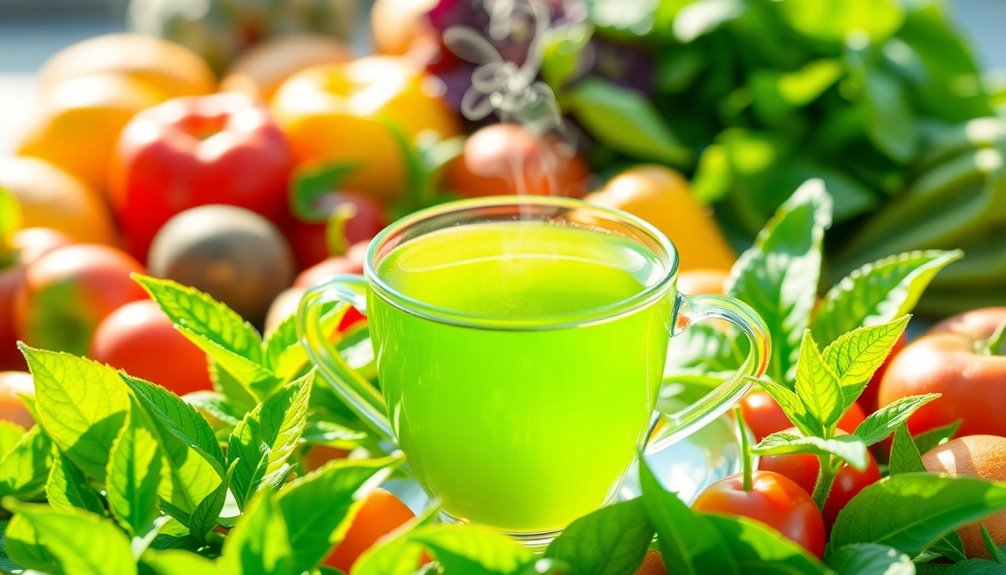
The power of antioxidants in tea can significantly boost your immune function, making it a valuable addition to your daily routine.
Green tea, in particular, is rich in beneficial compounds like catechins, which have been shown to enhance immune responses and reduce inflammation. When you regularly consume tea, you may notice an increase in the production of immune cells, such as T-cells and natural killer cells, crucial for fighting off infections. Additionally, studies show that certain teas may also aid in reducing allergens, further supporting overall health. Chia seeds, rich in antioxidants like quercetin, can complement your diet and further enhance immune function. Moreover, the incorporation of chia seeds into your meals can provide additional support for your immune system. Furthermore, the health benefits of rapeseed honey can also contribute to strengthening your immune system.
Research indicates that the antioxidant properties of tea combat oxidative stress, a factor that can weaken your immune system and lead to various health issues.
The polyphenols found in tea also play a vital role by inhibiting the growth of pathogens, thus enhancing your body's defense mechanisms against viruses and bacteria.
To reap the full immune-boosting benefits, consider drinking 3-5 cups of tea daily. This consistent intake allows the cumulative effects of its antioxidants to work in your favor, helping you maintain a robust immune system. Additionally, certain flower teas, such as hibiscus tea, are rich in antioxidants and may further support your immune health.
Antioxidant Levels Vary by Tea

Varying significantly in antioxidant content, different types of tea offer unique benefits that can enhance your health.
Green tea is particularly high in catechins, which are powerful antioxidants known for their health-boosting properties. On the other hand, black tea contains theaflavins, contributing to the antioxidant activity of black tea and providing distinct advantages for your well-being.
White tea stands out with a higher concentration of polyphenols than many other tea types, promoting overall wellness.
Oolong tea combines the strengths of both green and black teas, giving you a balanced antioxidant capacity that supports heart health. Additionally, oolong tea is rich in antioxidants and contains beneficial polyphenols that promote overall health.
If you prefer herbal options, rooibos tea delivers unique antioxidant properties, though it doesn't come from traditional tea leaves.
It's also important to note that the preparation method plays a role in the antioxidant levels you get.
Studies suggest that using hot water extraction and allowing longer steeping times can yield higher concentrations of antioxidants.
Tea's Impact on Skin Health

Understanding the antioxidant benefits of different teas naturally leads to their impact on skin health. Among these, green tea stands out for its high concentration of polyphenols, particularly catechins. These powerful antioxidants combat oxidative stress, protecting your skin from free radicals that contribute to aging. Regularly sipping green tea may boost collagen and elastin levels in your skin, enhancing elasticity and hydration.
Moreover, the antioxidants in green tea play a crucial role in mitigating photoaging caused by UV exposure. They can reduce skin damage, like burning and collagen loss, making your skin look healthier and more youthful.
Additionally, studies show that applying green tea extracts topically can further improve skin health by regulating free radicals and promoting repair.
If you struggle with redness or irritation, you'll appreciate the anti-inflammatory properties of green tea antioxidants. They can help calm acne-prone skin, making it a fantastic addition to your skincare routine.
Antioxidant Absorption Variability
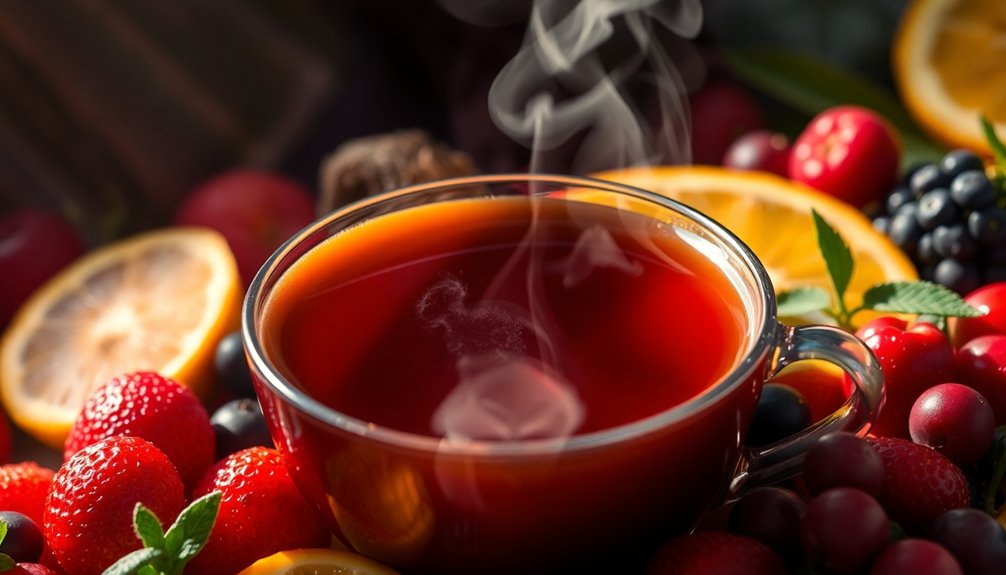
Antioxidant absorption from tea can differ widely depending on several factors, including the type of tea you choose. Green tea, known for its high catechin content, offers better absorption compared to theaflavins found in black tea. This means you may want to lean towards green tea for a more effective boost of antioxidants.
Steeping time and temperature also play crucial roles in how much antioxidant goodness you can extract. Longer steeping times generally increase antioxidant concentration, but be careful not to exceed 120 minutes—otherwise, you'll risk bitterness.
If you want to enhance absorption further, consider adding lemon juice. The vitamin C in lemon stabilizes catechins during digestion, making them easier for your body to utilize.
On the flip side, adding milk to your tea can hinder the absorption of beneficial flavonols by binding with them, potentially reducing the health benefits.
Lastly, remember that your individual gut health and overall diet can significantly influence how effectively your body absorbs these antioxidants. So, pay attention to these factors to maximize the health benefits you get from your tea!
Practical Applications

When brewing your tea, consider how the preparation methods can enhance your experience and health benefits. To maximize the antioxidant-rich properties of green and black tea, steep your tea for the optimal duration. Generally, longer steeping times yield higher antioxidant concentrations, but don't exceed 120 minutes. Additionally, using essential oils can increase the overall health benefits of your tea, making the experience even more enjoyable.
Incorporating pleasant scents from essential oils can also promote relaxation and improve mood while enjoying your tea.
You can also elevate your tea's health benefits by adding fresh lemon juice. This not only stabilizes catechins but also increases vitamin C, also known as ascorbic acid, which aids in antioxidant absorption.
Consuming a variety of teas, including green, black, and oolong, ensures a diverse intake of polyphenols and flavonoids, maximizing your health benefits.
If you're looking for a gentler method, try cold steeping tea. This technique preserves antioxidants and enhances flavor without bitterness.
Using glass teaware can further help maintain the quality of your tea, allowing you to appreciate the flavors while potentially improving the overall antioxidant experience. Additionally, incorporating essential oils for health such as peppermint or eucalyptus can further enhance your tea-drinking ritual by providing additional wellness benefits.
Conclusion
In conclusion, understanding the role of antioxidants in tea can enhance your health journey. By choosing the right types of tea, you can boost your immune function and support your skin health. Remember that antioxidant levels vary, so it's worth experimenting with different teas to find what works best for you. Stay mindful of how your body absorbs these powerful compounds, and enjoy the journey of discovering the benefits of your favorite brews!



